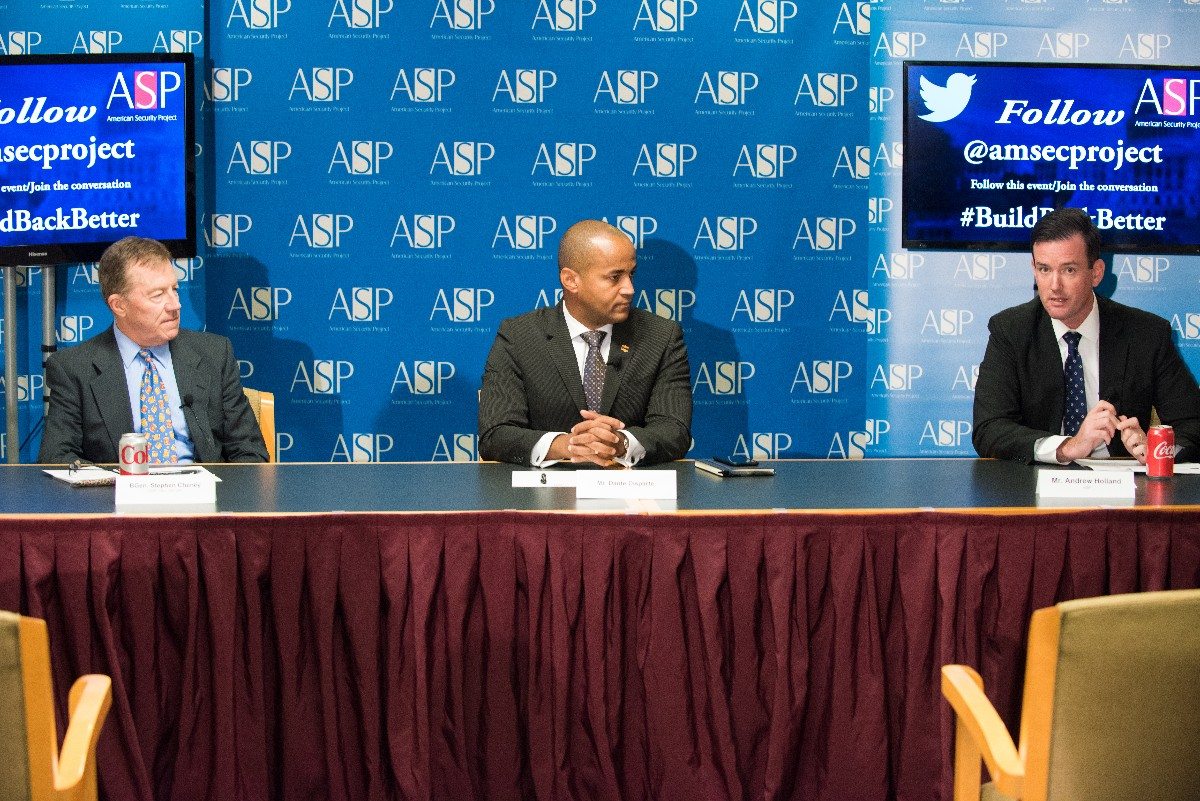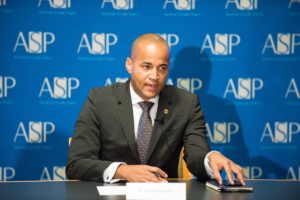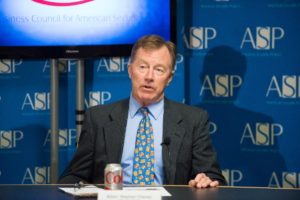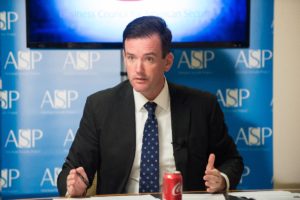
Event Recap: Build Back Better – Responding to Puerto Rico’s Crisis after Hurricane Maria
On October 4th, the American Security Project hosted an event on Build Back Better – Responding to Puerto Rico’s Crisis after Hurricane Maria. The panel included Dante Disparte, Chairman of American Security Project’s Business Council for American Security, and the founder and CEO of Risk Cooperative; Brigadier General Stephen A. Cheney, USMC (Ret.), Chief Executive Officer of American Security Project; and Andrew Holland American Security Project’s Director of Studies and Senior Fellow for Energy and Climate.
The panel discussed different strategies for addressing the unprecedented crisis taking place in Puerto Rico due to Hurricane Maria. The discussions centered on the long-term causes for the disaster in Puerto Rico, best policies going forward, financing issues that need to be overcome, and investment opportunities for the island. All of the participants agreed that in the wake of such a disaster, now was the time to address the many intractable problems facing Puerto Rico and to rebuild and revitalize the island better than before.

As a native Puerto Rico and with many family members still on the island, Mr. Disparte had a very personal connection to the tragedy taking place. He explained how when he was a boy growing up in Puerto Rico he experienced firsthand the devastation of Hurricane Hugo. He pointed out that Puerto Rico was already facing numerous problems; the territory is poorer than any U.S. state with an average of $20k per house hold, goods cost 30 percent more than they do in the U.S. due to the Jones Act, and average electricity prices are 4 times as high as Florida due to antiquated electricity regulations, which is the highest in the Caribbean. He said that, “It’s almost as if we are deliberately strangling Puerto Rico.” He pointed out that Puerto Rico is already the site of the largest non-violence driven mass migration in the world, with over 500,000 people leaving in the last decade. The lack of effective action after this disaster could drive much of the rest of the population to migrate and seek refuge in the continental U.S. He recommended that the U.S. provide every source of relief at its disposal and to turn this crisis into an opportunity to showcase how to rebuild in a resilient manner after such a massive disaster.

Brigadier General Stephen A. Cheney, USMC (Ret.), explained how he had significant experience in responding to Hurricane disasters. He was the Command General of Marine Corps Recruit Depot Parris Island in South Carolina when Hurricane Floyd glanced the area, and was President of the Marine Military Academy in Harlingen, Texas when Hurricane Dolly hit the area, causing massive flooding and power outages. He explained that the Department of Defense was slow to react to the aftermath of Hurricane Maria in Puerto Rico. However, based on his own previous experience with logistics after hurricanes, the problems one is faced with can be tremendous and overwhelming to effectively address. On causes, he stated, that, “while there is no clear indication that the frequency of hurricanes is increasing, it’s clear that the average intensity of hurricanes are increasing.” Therefore, we must be proactive in how we prepare for and respond to future hurricanes and extreme weather events. He mentioned how when the U.S. military took over Okinawa, Japan it rebuilt the area after WWII the “right way,” so that it would be much resilient to the storms that blow through. As a result, the area still hasn’t suffered another major weather catastrophe despite multiple hits by powerful typhoons. The experience shows how “building back better,” after a disaster is the most cost-effective solution over the long-term. He emphasized that the same sort of long-term thinking should be applied towards rebuilding efforts in Puerto Rico.

Mr. Holland pointed to long term issues that have plagued Puerto Rico including: policies such as the Jones act which have increased the cost of goods on island, long-term financing issues which have saddled the country with insurmountable levels of debt, and a poor investment environment due to higher energy costs and lack of infrastructure. He recommended rebuilding in ways that don’t create more debt, waiving FEMA cost shares, and permanently eliminating the Jones Act. He also recommended rebuilding the electrical infrastructure in a more decentralized, less regulated manner, with large investments in renewable energy. He referred to Adam Siegel’s 4 R’s as a good framework to address the current crisis in Puerto Rico. Those include; relief to help save those that are suffering and providing the basic resources and services, recovery to help society return to a functioning stage, reconstruction to rebuild the infrastructure and housing back to where it was prior to the disaster, and lastly to invest in resiliency by pursuing measures that help reduce vulnerability to future disasters. He recommended revitalizing Puerto Rico in a manner that brings back jobs, improves the economy, increases self-sufficiency, and provides long term security, by providing the necessary financing and policy reform. In the long-term the way we deal with territories like Puerto Rico will affect how we respond in future disasters. It is therefore in our best interest to help the most vulnerable in our society and learn from this experience to improve how we respond in the future.
There is much to be done to rebuild Puerto Rico. The American Security Project will be actively involved in discussing legislation to build back better on the island. After such devastation, the United States has a limited opportunity to show how the island could become the “Singapore of the Caribbean.”
See the full video of the event below:






